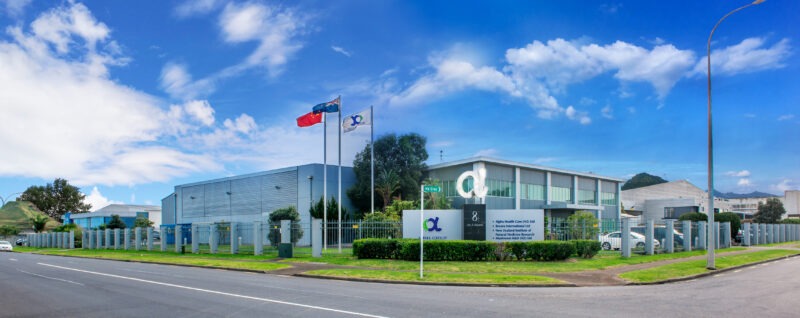Kiwi garage start up one of largest dual market export operations
Set for $115m expansion in China
A Kiwi company that began as a West Auckland garage start-up nearly three decades ago has grown into one of NZ’s largest dual-market export operations, and is set for further expansion with the construction of a new $115m biotech manufacturing facility in China underway.
Manukau-based Alpha Group is a vertically integrated nutraceutical exporter at the international forefront of fermentation technologies. The company produces patented fungal and plant-based bioactives, with integrated research and manufacturing operations across New Zealand and China.
The new 60,000m² facility in Ningde will support New Zealand’s fermentation export capabilities by integrating advanced R&D, testing, treatment and production.
Once complete, it is expected to generate more than NZ$225 million in annual revenue and expand Alpha’s transnational footprint to over 119 hectares.
To date, the company has invested over NZ$830 million in developing this global infrastructure.
Alpha Group was founded in New Lynn in 1998 by Professor Yihuai Gao, a globally recognised researcher in medicinal fungi and honorary fellow at Massey University’s Riddet Institute.
Mike Arand, Alpha Group senior business advisor, says the new facility is the physical realisation of Alpha’s long-term dual-market strategy, which combines New Zealand’s scientific and natural resource strengths with China’s demand, scale and infrastructure.
 He says the development bridges lab-to-market pathways, turning New Zealand-led research into commercial outcomes that drive export growth and reinvestment into local R&D.
He says the development bridges lab-to-market pathways, turning New Zealand-led research into commercial outcomes that drive export growth and reinvestment into local R&D.
“This facility unlocks exponential growth potential for New Zealand’s fermentation sector.
“By integrating R&D and processing in one hub close to our largest export market, we can boost output, reduce lead times and increase demand for Kiwi-derived ingredients.
“It’s about creating a transnational innovation ecosystem where New Zealand science drives offshore commercial outcomes, which then feed back into local jobs, R&D and raw material demand,” he says.
Alpha Group has already attracted global attention for its patented fermentation method that grows Ganoderma Lingzhi mycelium.
Used in traditional medicine for immunity, cardiovascular health and anti-inflammatory support, it now grows in under 10 days compared to the six-month growth cycle in the wild.
Approved by New Zealand’s Environmental Protection Authority, the technology enables consistent bioactive yields at scale and is the first of its kind to be commercialised in this country.
The innovation was developed six years ago by Professor Gao in collaboration with Callaghan Innovation and Massey University. It is seen as a flagship example of New Zealand’s growing strength in natural health and functional food technology.
Ganoderma Lingzhi has been used in traditional Chinese medicine for over 2,000 years, but this lab-based approach opens the door to a new class of high-value, environmentally stable food and health exports.
Professor Gao says the breakthrough represents a turning point in how New Zealand can grow and export natural therapeutics.
“Fermentation is one of the most exciting global food technologies today. It offers us a way to produce clean, bioactive-rich compounds from fungi and plants in a controlled environment free from soil, weather or climate volatility, or without requiring large tracts of land or disrupting native ecosystems.”
“Ganoderma Lingzhi is one of the most revered mushrooms in traditional Chinese medicine, used for thousands of years to support immunity, cardiovascular function and overall wellbeing. But growing it traditionally is slow, unpredictable and difficult to scale.”
“Our fermentation method not only replicates the active compounds found in the wild species, but it does so in days instead of months under precise conditions that ensure consistency, purity and potency.”
“What we have built with Lingzhi is a platform that can be adapted to other medicinal fungi, plants and marine compounds, and now not only can we unlock new export streams from organisms that are difficult or impossible to cultivate here, we can dramatically accelerate research into other plants and fungi that support human health.
“That opens the door to a whole new category of science-led exports for New Zealand,” he says.



